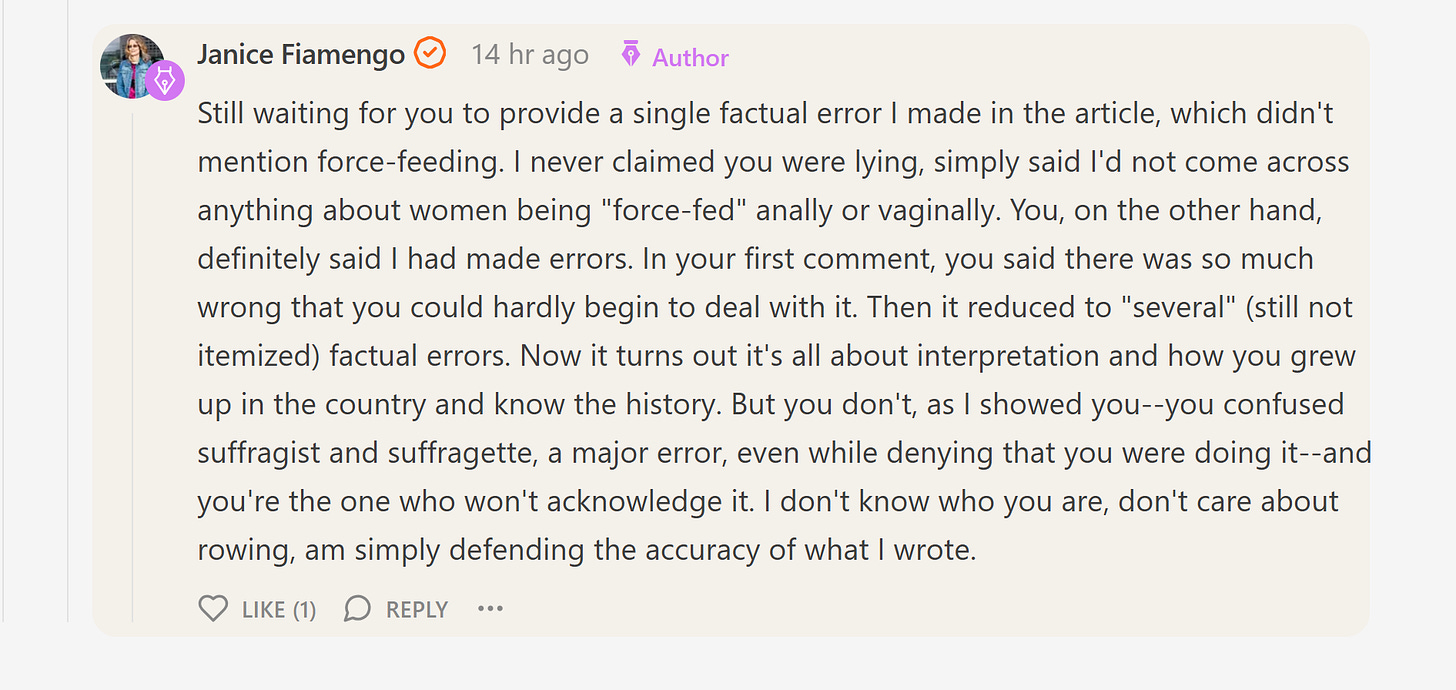Yesterday I wrote this:
In response to this:
I cross posted my article onto that thread and after a few of exchanges I log on this morning to find this from the author of the original post.
I started to type out a reply but it got too big for a comment on my phone. It is 10:45 am Eastern as I write this and I am up against a hard 12.00 pm stop. Hence the stream of consciousness approach that I do not favour. Anyway here goes.I am not going to respond to any of the other comments but perhaps what I need to do in the future is to completely deconstruct your original article. It won’t be soon as I have multiple projects with bottlenecks. I don’t necessarily write my article series in order of publication and am currently writing seven series in parallel. To get a sense of that.
This is my response to your comment but consider it as a placeholder.
First of all on Emmeline Pankhurst. If anyone does not think she supported the poor man’s suffrage they have to be deliberately not seeing it. I will build that case in a future series because it involves leaflets and appeals to men, lots of pieces to be assembled. But make no mistake I have provided the sources for all of that for those bothered to look. In the interim I provide a link to a speech she gave in Connecticut which sets out her philosophy.
It is an extremely famous speech and many commentaries already exist. So to anyone reading this, if you are interested, go find out for yourselves. It is also available in US archives including the Iowa University. I picked this link because the summary may help - it was a long speech but of course it is searchable. I would recommend reading the entire thing though.
What you wrote was devoid of the historic context. The context you use is feminism today. I also detest third wave feminism because I think it is fundamentally anti-human - a story for another bedtime perhaps.
The point you are trying to make is that the tactics are the same. They are not. Your piece was making the point that the suffragettes were amoral violent radicals. Nothing could be further from the truth. They had multiple just causes.
I am not an historian but I did benefit from the time when the great narratives of history were taught. I grew up in an era when all of this was in the range of living memory in the country where it happened.
That there are different slants on any history should be self-evident - it’s not some new discovery of recent times. The sources you mention had similar narratives and it is obvious why you chose those sources - I wouldn’t dismiss them but I can argue against some of the conclusions.
By contrast the links I put in my article to resources contained pages of information with criticism of the suffragettes which I have also read. I was actually hoping people would read some of that so a serious conversation could be started. Unfortunately those who did comment didn’t have the wherewithal to notice those contemporary critical pieces - because they don’t know enough to understand the significance to their own argument.
Most of the contemporary information from that time was anti-suffragette because guess who controlled the press back then? I am not going to join all the dots for everyone because I hate the feeling of stating the obvious.
Those who have commented on different aspects, don’t even acknowledge the evidence provided, because they cannot bear to read something that goes against their views. Thinking that was something we were both opposed to is an error that I freely confess.
The conversation didn’t even get to that level of what is true and what it means. It is difficult to have discussions with people who start off with a point of view and are searching for the information to support it in real time.
In a post that I think you read, I gave an example of a suffragette who was investigating a lynching atrocity in Waco Texas, where I was making the comparison between mob culture then and cancel culture now.
I knew the basic story, recognised it’s significance and then just made sure the details were right. I had two headings in that piece, 1916 and 2015, it was a comparison and not conflation, viz.
Yet staying on that subject, why did Elisabeth Freeman (a suffragette trained in England), go undercover to investigate the lynching of an accused rapist and murderer? An odd form of misandry surely. The suffragettes were not a mob. They committed criminal damage and usually waited to be caught because their actions were political.
Yet that is not what you are engaging in with this thread. You show no discernment whatsoever; if there is an argument that supports you, no matter how bizarre or ridiculous, you ‘like’ it.
You entertain the argument about suffragette reparations - which is a strawman because who is advocating for any reparations in this thread? It suits you to class any opposing argument under the umbrella of current feminism. I am unequivocally against any kind of reparation for historic wrongs. I don’t ‘like’ things out of convenience for my argument if they are not true. I call it out no matter who said it.
Yet this is characteristic of another thing. People who do not understand history who try to categorise in modern terms. This is post-modernist thinking that I thought you were opposed to but seem to be simultaneously trapped within it. Another ‘tell’ is focussing on semantics.
You are fixated on a term and making a distinction that is completely irrelevant. This is the level of the conversation where no basic knowledge can be assumed - even of the English language. Let me try again.
Suffragist organisations and suffragettes were all part of the same over-arching suffrage movement. Malcolm X and MLK didn't have the same approach and even their organisations split further. You don’t seem to understand that suffragette is the specially female sub-category of the fight for a vote - i.e. for suffrage. It’s if you just noticed there is any kind of distinction from my silent YouTube video. The point is the movement was supported by men who understood the mutual interest. Period.
Yes the whole point of the suffragettes is to fight for Women’s suffrage but it just so happens that as well as being part of the movement it was also leading most of it. You just want to separate out the bits you think you can go along with to isolate what you think to be a malicious element. It’s the rejection of nuance and complexity that I find most baffling.
If I were to talk about the history of trade union movement in the UK I might speak about the Transport and General Workers Union or Associated Engineering Union, the miners various unions- they were part of the same movement under the Trade Union Congress but with their own aims that were roughly aligned. What level do I need to take this down to?
Let’s set aside the fact you seem to think Emmeline Pankhurst was a man-hater - there is evidence to the contrary but it makes no difference to my argument what you think.
She was a strategist. Do you think she only wanted rich women to get the vote? Do you think she did not realise that she could not achieve her aims for poor women without helping poor men too?
Before all this she campaigned against the conditions of the workhouses. It was where the destitute ended up effectively as indentured slaves - imprisoned, forced labour with sustenance rations. This is an important point.
Poverty was seen as a problem best eradicated by starvation so that was the mentality that prevailed. The Workhouse was both a deterrent for the poor and a solution - as if anyone choses to be poor. It was why there was a famine in Ireland. Food was exported to the UK while Ireland starved - millions died. The poor were a scourge to be eliminated. She opposed that from a minority position.
Was she only campaigning for women and children in the workhouses? Even if she wanted to how would she have possibly been able to do that without supporting the cause of men? Her husband was involved up until his death in her earlier organisations and many significant male figures supported the various associations Pankhurst created, advocating for the poor and oppressed. Men even formed armed guards for women marchers.
It was a time when marriageable age was 12 for women. Where everything a woman had, including her children could be taken away on the whim of her husband. She could be put into an insane asylum on his say so. If she had family money it became his. They were targeting the property of people who had the vote because they had the power to make a difference. You evidently have no idea of the context. Zero.
The terminology that you feel is so important because is because what is of real importance has whizzed overhead. There is nothing fanciful about this - nothing surprising. Today we no longer talk about 'actresses' because we call them all actors. Before that did people think actresses were doing something completely different from acting? Does it matter that there are different kinds of acting? Without understanding the context there is no way to make a comparison with what is happening today.
This is part of a bigger problem. The arc of history is no longer understood. Everything is through the lens of something people have just read - it is easy to tell because they have no depth to their argument. They become fixated on unimportant aspects and they have to run off to search Wikipedia or YouTube. Anybody who was interested in understanding the truth would be trawling the resources I provided but is it more convenient to cherry pick with a search engine.
I would never provide a Wikipedia article as a proxy for my argument as you did - because if I go in to bat I have an argument and a position already, I am not winging-it. I make my own arguments and then back them up with information as close to the source as possible. I am open to have my mind changed but it is unlikely to be by people whose argument is one page behind their Wikipedia reading.
To be clear I am no Wikipedia or YouTube snob. I use them too as tools and think they are great. I have used Wikipedia to get the outline of something and then check out the relevant references; but it is only ever a starting point when I am not confident about a subject or am not sure of the informational landscape. I never publish those idea forming projects. When I write I always cite. I don’t pick something out of a YouTube video without providing the context or pass it off as something I read.
People pitching in here are not asking the right questions to understand anything.
For instance:
What was Pankhurst's strategy?
What were the targets and why?
What was her justification for her methods?
Why did it cause a further schism later on?
Why did those committing those acts wait to get arrested?
Why did they later campaign for prison reform and not just for women?
What events changed the direction of travel?
What did Pankhurst say when she visited the US and Canada?
As per the article I previously referenced: why did Elisabeth Freeman investigate the case of an accused rapist and murderer? That is inconsistent with man-hating.
You are asking me for a citation yet if you are familiar with her activities you will have surely read what she said when she toured North America. There you can find a lot of answers… assuming you want them. I provided a link above remember.
Some of the people have said there is no evidence of vaginal or anal force-feeding despite the fact I have provided it. You have not acknowledged that I provided it. That is partly your selective bias but more importantly it is because you don’t want to alienate those who are supporting you by admitting it.
Worse than that, you ‘liked’ a comment that questioned it could ever happen, which is frankly a disgrace. That is the root of intellectual cowardice at play here. This is an example of the genesis of a mob.
Others are expecting me to come up with the mechanics of vaginal feeding as if I would even want to acquaint myself to that level of detail. Perhaps they are typing their requests one-handed in anticipation. They will be disappointed.
I am interested in truth not coteries.








